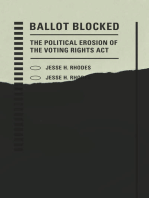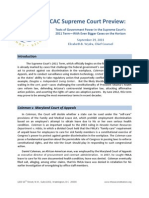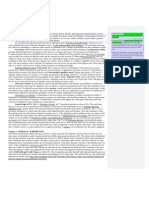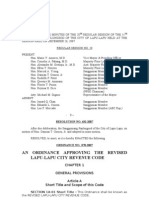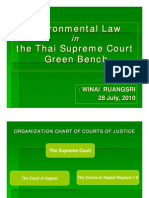Civil Procedure Brief/Notes 9-6 Federal Question Jurisdiction
Civil Procedure Brief/Notes 9-6 Federal Question Jurisdiction
Uploaded by
Rebecca LopesCopyright:
Available Formats
Civil Procedure Brief/Notes 9-6 Federal Question Jurisdiction
Civil Procedure Brief/Notes 9-6 Federal Question Jurisdiction
Uploaded by
Rebecca LopesOriginal Title
Copyright
Available Formats
Share this document
Did you find this document useful?
Is this content inappropriate?
Copyright:
Available Formats
Civil Procedure Brief/Notes 9-6 Federal Question Jurisdiction
Civil Procedure Brief/Notes 9-6 Federal Question Jurisdiction
Uploaded by
Rebecca LopesCopyright:
Available Formats
Civil Procedure Brief/Notes 9-6 Federal Question Jurisdiction The Framers of the Constitution recognized that federal courts,
, created and administered by the federal government, must have the power to interpret and enforce federal law. Otherwise, the national government could be rendered powerless by hostile state court interpretations of the meaning and constitutionality of federal law. Early statutes authorized the federal trial courts to hear cases arising under particular federal statutessuch as the immigration and patent statutes. Most cases arising under federal law still were litigated in the state courts, subject of review in the US Supreme Court. It was not until 1875 that Congress, fearing that the state courts would not vigorously enforce the federal civil rights statutes enacted during the Reconstruction, granted broad jurisdiction over cases arising under federal law to the lower federal courts. Today, 28 U.S.C. 1331 grants jurisdiction to the federal district court over all cases arising under the Constitution, laws or treaties of the United States. Suits to enforce those laws arise under federal law, so that federal courts have jurisdiction over them under 28 U.S.C. 1331. The Constitutional Scope of Federal Question Jurisdiction So long as there is federal ingredient in the action, whether it is introduced by the plaintiffs claims or by a defense asserted in the defendants answer, Osborn holds that Article III section 2 grants federal question jurisdiction over the case. o For example, if Conway sues Deliso under a federal statute that authorizes suits for violation of federal civil rights, the case arises under federal law. o Similarly, if Conway sues for libel, a state claim, and Deliso raises the defense that his First Amendment rights protected him, the case would satisfy federal question jurisdiction. THIS NO LONGER HOLDS. **The following case illustrates that there is a major difference between a case that involves federal law and one that arises under federal law.**
Louisville & Nashville Railroad Co. v. Mottley 211 U.S. 149 (1908) Facts: The suit was filed because Mr. and Mrs. Mottley did not receive their end of a contract made between them and the railroad company. On October 2, 1871 the couple released the company from all damages or claims for damages they received by them on the September 7, 1871 due to a collision of trains on the railroad. The company agreed to issue free passes to the couple that year and renew them every year. It is alleged that the contract was performed by the defendant up until January 1, 1907. The defendant, at that time, declined to renew the passes because Congress passed an act on June 29, 1906 which forbids the giving of free passes or free transportation. The bill goes on to saw, however, that the act of Congress referred to does not prohibit the giving of passes under the circumstances of this case; and if the law is to be construed as prohibiting such passes, it is in conflict with the 5th amendment of the United States Constitution, because it deprives the plaintiffs of their property without due process of law. Issues:
Does the mere allegation of an anticipated defense that arises under federal law create a federal question giving a federal court jurisdiction? May a suit be dismissed at the appellate level for lack of subject matter jurisdiction?
Procedural History: The appellees, Mr. and Mrs. Mottley, brought this suit in a federal trial court of the United States against the appellant, Louisville & Nashville Railroad Co. stating that it was a federal issue at hand. After the defendants demurrer was overruled (he demurred based on the bill that Congress passed), he appealed directly to Supreme Court. Judgment: Reversed Holding: The application of this rule (Tennessee v. Union & Planters Bank) to the case at bar is decisive against the jurisdiction of the federal trial court. It is ordered that the judgment be reversed and the case remitted to the circuit court with instructions to dismiss the suit for want of jurisdiction.
Rule: In Tennessee v. Union & Planters Bank, 152 U.S. 454, the state of Tennessee, brought suit in the circuit court of the United States to recover from the defendant certain taxes alleged to be due under the laws of the state. This suit was in violation of the provision of the Constitution of the United States which forbids any state from passing a law impairing the obligation of contracts. A suggestion of one party, that the other will or may set up a claim under the Constitution or laws of the United States, does not make the suit one arising under that Constitution or those laws. The complainant in the first instance shall be confined to a statement of its cause of action. Reasoning: These two issues were brought up in lower courts, but the Supreme court did not deem it necessary to consider either of the questions because the court below was without jurisdiction of the cause. 1. Does the act passed on June 29, 1906 make it unlawful to perform a contract for transportation of persons who, in good faith, before the passage of the act, had accepted such contract in satisfaction of a valid cause of action against the railroad? 2. Is the statute in violation of the 5th amendment (due process)? The suit was brought because of a violation of contract, not under a federal statute or issue.
Notes The Mottleys case was based on Kentucky contract law, not federal law. It is often said that Mottley illustrated a well-pleaded complaint rule, which means that the defense brought up an argument that relied on federal law. If anticipating federal defenses sufficed to get a case into federa court, creative lawyers who wanted to litigate in federal court would doubtless manage to anticipate one. They would sue in federal court, plead their state law claim, and then allege some federal defense that might be asserted. But suppose the defendant didnt oblige; she answered the complaint raising only state law defenses. Presumably, the case would then have to be dismissed. The Mottley rule allows the court to determine its jurisdiction without demanding an immediate answer to the complaint or relying on the plaintiffs representations about likely defenses. The issues disputed in Mottley, were ironically, federal issues: the meaning of the statute and if the statute prohibited renewal of passes, did it deprive the Mottleys of due process? However, Supreme Court found that the case is not a federal question case. The only source of a right to relief against he railroad was the contract, so
their counsel would not be able to create a federal jurisdiction by redrafting their complaint. Tennessee v. Union found that anticipated defenses and rebuttals cannot be considered in determining whether the case arises under federal law. When Supreme Court dismissed the case it nullified the entire course of the litigation and left the parties back at square one. Justice Oliver Wendell Holmes argued that a suit arises under the law that creates the cause of action. In Mottley, for example, the law that created the plaintiffs cause of action was contract law; thus the suit arose under contract law, which is state law. Mottley would not satisfy the Holmes test. State courts usually may hear cases within the federal subject matter jurisdiction. They have concurrent jurisdiction over cases arising under federal law, unless Congress specifies that particular type of federal claim must be brought in federal court.
You might also like
- Political Law Compilation Bar Q&a 1987-2017 PDFDocument437 pagesPolitical Law Compilation Bar Q&a 1987-2017 PDFAna Logosandprints90% (41)
- Anti-SLAPP Law Modernized: The Uniform Public Expression Protection ActFrom EverandAnti-SLAPP Law Modernized: The Uniform Public Expression Protection ActNo ratings yet
- Brown Opposition To Motion To Compel ArbDocument9 pagesBrown Opposition To Motion To Compel ArbRalph Rogari100% (1)
- R 8 - Memo Freshers - Moot CourtDocument17 pagesR 8 - Memo Freshers - Moot CourtAshish RanjanNo ratings yet
- Ontario v. Samira - ComplaintDocument40 pagesOntario v. Samira - ComplaintSarah BursteinNo ratings yet
- Petition for Certiorari: Denied Without Opinion Patent Case 93-1413From EverandPetition for Certiorari: Denied Without Opinion Patent Case 93-1413No ratings yet
- Gale Researcher Guide for: Overview of US Criminal Procedure and the ConstitutionFrom EverandGale Researcher Guide for: Overview of US Criminal Procedure and the ConstitutionNo ratings yet
- Summary: The Constitution in Exile: Review and Analysis of Andrew P. Napolitano's BookFrom EverandSummary: The Constitution in Exile: Review and Analysis of Andrew P. Napolitano's BookRating: 5 out of 5 stars5/5 (1)
- Gale Researcher Guide for: The Role and Structure of the US Supreme CourtFrom EverandGale Researcher Guide for: The Role and Structure of the US Supreme CourtNo ratings yet
- MPRE Unpacked: Professional Responsibility Explained & Applied for Multistate Professional Responsibility ExamFrom EverandMPRE Unpacked: Professional Responsibility Explained & Applied for Multistate Professional Responsibility ExamNo ratings yet
- Petition for Certiorari Denied Without Opinion: Patent Case 98-1972.From EverandPetition for Certiorari Denied Without Opinion: Patent Case 98-1972.No ratings yet
- Lighting the Way: Federal Courts, Civil Rights, and Public PolicyFrom EverandLighting the Way: Federal Courts, Civil Rights, and Public PolicyNo ratings yet
- Regulatory Breakdown: The Crisis of Confidence in U.S. RegulationFrom EverandRegulatory Breakdown: The Crisis of Confidence in U.S. RegulationNo ratings yet
- An Inexplicable Deception: A State Corruption of JusticeFrom EverandAn Inexplicable Deception: A State Corruption of JusticeNo ratings yet
- Ballot Blocked: The Political Erosion of the Voting Rights ActFrom EverandBallot Blocked: The Political Erosion of the Voting Rights ActNo ratings yet
- Reaching the Bar: Stories of Women at All Stages of Their Law CareerFrom EverandReaching the Bar: Stories of Women at All Stages of Their Law CareerNo ratings yet
- Florida Real Estate Exam Prep: Everything You Need to Know to PassFrom EverandFlorida Real Estate Exam Prep: Everything You Need to Know to PassNo ratings yet
- Business Organizations: Outlines and Case Summaries: Law School Survival Guides, #10From EverandBusiness Organizations: Outlines and Case Summaries: Law School Survival Guides, #10No ratings yet
- Administrative Law Judge: Passbooks Study GuideFrom EverandAdministrative Law Judge: Passbooks Study GuideNo ratings yet
- Divorce: Why Fighting in Court Will Only Make You Both PoorerFrom EverandDivorce: Why Fighting in Court Will Only Make You Both PoorerNo ratings yet
- Jim Crow and Me: Stories From My Life As a Civil Rights LawyerFrom EverandJim Crow and Me: Stories From My Life As a Civil Rights LawyerNo ratings yet
- Civil Procedure II OutlineDocument105 pagesCivil Procedure II OutlineRaeAnn KragenbringNo ratings yet
- First Nat. Bank of Chicago v. United Air Lines, Inc., 342 U.S. 396 (1952)Document5 pagesFirst Nat. Bank of Chicago v. United Air Lines, Inc., 342 U.S. 396 (1952)Scribd Government DocsNo ratings yet
- Houston v. City Bank of New Orleans, 47 U.S. 486 (1848)Document20 pagesHouston v. City Bank of New Orleans, 47 U.S. 486 (1848)Scribd Government DocsNo ratings yet
- Marbury Vs Madison 5 US 137 (1803)Document10 pagesMarbury Vs Madison 5 US 137 (1803)Christine ErnoNo ratings yet
- Term Preview 2011Document6 pagesTerm Preview 2011MyConstitutionNo ratings yet
- Briefs For 8/26: Wednesday, August 25, 2010 9:08 PMDocument34 pagesBriefs For 8/26: Wednesday, August 25, 2010 9:08 PMSamuel FreedmanNo ratings yet
- United States v. Swiss American, 191 F.3d 30, 1st Cir. (1999)Document19 pagesUnited States v. Swiss American, 191 F.3d 30, 1st Cir. (1999)Scribd Government DocsNo ratings yet
- Richards v. United States, 369 U.S. 1 (1962)Document12 pagesRichards v. United States, 369 U.S. 1 (1962)Scribd Government DocsNo ratings yet
- TGAS Advisors v. Zensights - Jurisdiction Opinion PDFDocument10 pagesTGAS Advisors v. Zensights - Jurisdiction Opinion PDFMark JaffeNo ratings yet
- 2d - Muskrat Vs UsDocument1 page2d - Muskrat Vs UsYash ManinNo ratings yet
- Federal Courts and Jurisdiction OutlineDocument27 pagesFederal Courts and Jurisdiction OutlineCasey Miller50% (2)
- Samuel Weaver and Alice Weaver v. Marine Bank, 683 F.2d 744, 3rd Cir. (1982)Document12 pagesSamuel Weaver and Alice Weaver v. Marine Bank, 683 F.2d 744, 3rd Cir. (1982)Scribd Government DocsNo ratings yet
- Horton v. Liberty Mut. Ins. Co., 367 U.S. 348 (1961)Document12 pagesHorton v. Liberty Mut. Ins. Co., 367 U.S. 348 (1961)Scribd Government DocsNo ratings yet
- Madzimoyo v. The Bank of New York Mellon Trust Company, Etc., 11th Cir. (2011)Document5 pagesMadzimoyo v. The Bank of New York Mellon Trust Company, Etc., 11th Cir. (2011)Scribd Government DocsNo ratings yet
- Talking Points-Judicial RestraintDocument12 pagesTalking Points-Judicial RestraintBrandon McNally100% (1)
- Atlantic Coast Line R. Co. v. Locomotive Engineers, 398 U.S. 281 (1970)Document17 pagesAtlantic Coast Line R. Co. v. Locomotive Engineers, 398 U.S. 281 (1970)Scribd Government DocsNo ratings yet
- Suydam v. Broadnax, 39 U.S. 67 (1840)Document11 pagesSuydam v. Broadnax, 39 U.S. 67 (1840)Scribd Government DocsNo ratings yet
- Judicial Immunity V Due Process, Robert Craig WatersDocument14 pagesJudicial Immunity V Due Process, Robert Craig WatersNeil GillespieNo ratings yet
- Civ Pro OutlineDocument26 pagesCiv Pro Outlinekelolaboy100% (1)
- Seng Con Law OutlineDocument64 pagesSeng Con Law OutlineDanielle McKinleyNo ratings yet
- United States Fidelity & Guaranty Co. v. United States Ex Rel. Struthers Wells Co., 209 U.S. 306 (1908)Document8 pagesUnited States Fidelity & Guaranty Co. v. United States Ex Rel. Struthers Wells Co., 209 U.S. 306 (1908)Scribd Government DocsNo ratings yet
- ALDEN V. MAINE (98-436) 527 U.S. 706 (1999) 715 A. 2d 172, Affirmed.Document4 pagesALDEN V. MAINE (98-436) 527 U.S. 706 (1999) 715 A. 2d 172, Affirmed.Lisa Stinocher OHanlonNo ratings yet
- Legal DoctrinesDocument294 pagesLegal DoctrinesMon Señorito EdmundoNo ratings yet
- Cole V Cunningham - 133 U.S. 107 (1890)Document13 pagesCole V Cunningham - 133 U.S. 107 (1890)Dan GoodmanNo ratings yet
- Chapter 1: CCC C CC CCC C CC CC CDocument9 pagesChapter 1: CCC C CC CCC C CC CC CTimur NavruzovNo ratings yet
- Erie Railroad vs. Harry Tompkins, 304 US 64, April 25, 1938Document4 pagesErie Railroad vs. Harry Tompkins, 304 US 64, April 25, 1938Jacinto Jr JameroNo ratings yet
- Loveridge v. Hall, 10th Cir. (2015)Document21 pagesLoveridge v. Hall, 10th Cir. (2015)Scribd Government DocsNo ratings yet
- 2011.10.18 Mid-Term Review UpdatedDocument7 pages2011.10.18 Mid-Term Review UpdatedCalvin LiangNo ratings yet
- Ruling On Transgender Healthcare BillDocument13 pagesRuling On Transgender Healthcare BillJessie BalmertNo ratings yet
- Over Street LawsuitDocument16 pagesOver Street Lawsuitray sternNo ratings yet
- Foster-Gallego v. GalangDocument8 pagesFoster-Gallego v. GalangCamille DomingoNo ratings yet
- LLC Revised Revenue CodeDocument124 pagesLLC Revised Revenue CodeSepiroth Lionheart100% (1)
- Winai Ruangsri - Environmental Law in The Thai Supreme Court Green BenchDocument13 pagesWinai Ruangsri - Environmental Law in The Thai Supreme Court Green BenchAsian Judges Symposium on Environmental Decision Making, the Rule of Law, and Environmental JusticeNo ratings yet
- Admin Cases 37 - 61Document156 pagesAdmin Cases 37 - 61Hole SaraNo ratings yet
- First Philippine Industrial Corporation Vs CADocument9 pagesFirst Philippine Industrial Corporation Vs CAValentine MoralesNo ratings yet
- Manotok Brothers V CADocument3 pagesManotok Brothers V CAJoshua Erik MadriaNo ratings yet
- International Commercial ArbitrationDocument110 pagesInternational Commercial Arbitrationsaditha manjulahari100% (2)
- Comparative Analysis. Salazar. RussiaDocument2 pagesComparative Analysis. Salazar. RussiaSophia Kaye SalazarNo ratings yet
- Johannes V ImperialDocument4 pagesJohannes V ImperialJarvy PinonganNo ratings yet
- 395-People-v-Navarro 63 SCRA 364 DigestDocument2 pages395-People-v-Navarro 63 SCRA 364 DigestArlen RojasNo ratings yet
- PROVREM Final ExamDocument27 pagesPROVREM Final ExamXandredg Sumpt LatogNo ratings yet
- Civil Court and Code of Civil ProcedureDocument17 pagesCivil Court and Code of Civil ProcedureShubhankar ThakurNo ratings yet
- BENJAMIN "KOKOY" ROMUALDEZ v. SANDIGANBAYANDocument1 pageBENJAMIN "KOKOY" ROMUALDEZ v. SANDIGANBAYANBryce Lawrence TuazonNo ratings yet
- Sample DigestDocument3 pagesSample DigestJaylordPataotaoNo ratings yet
- Failure To File Written Submission CaseDocument4 pagesFailure To File Written Submission CaseOmar SaidNo ratings yet
- Buaya vs. Polo Case DigestDocument1 pageBuaya vs. Polo Case Digestjen quiambao100% (1)
- 13th Recitation 1024-1060Document38 pages13th Recitation 1024-1060Xandredg Sumpt LatogNo ratings yet
- LLM 104 B - Criminology & Cr. Justice AdministrationDocument60 pagesLLM 104 B - Criminology & Cr. Justice AdministrationNonit HathilaNo ratings yet
- FEA ComplaintDocument58 pagesFEA ComplaintLynn HatterNo ratings yet
- People V GemoyaDocument4 pagesPeople V GemoyaaudreyracelaNo ratings yet
- Case Digest For Legal ResearchDocument5 pagesCase Digest For Legal ResearchALLIAH CLARISSE PACHECONo ratings yet
- Villagracia v. Fifth Shari'a District Court, G.R. No. 188832, April 23, 2014Document27 pagesVillagracia v. Fifth Shari'a District Court, G.R. No. 188832, April 23, 2014Aira Dela VegaNo ratings yet
- CD Martinez V BuenDocument2 pagesCD Martinez V BuenCayen Cervancia CabiguenNo ratings yet
- Lawsuit Accuses Precinct 2 Constable of Trying To Caress Deputy in Hot Tub During Work TripDocument6 pagesLawsuit Accuses Precinct 2 Constable of Trying To Caress Deputy in Hot Tub During Work TripDillon CollierNo ratings yet
- CAVEATDocument6 pagesCAVEATPallab SinghaNo ratings yet




















